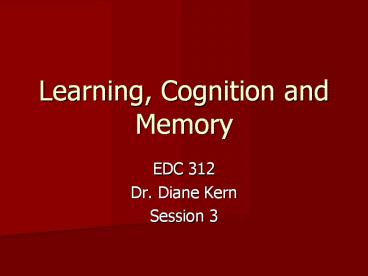Learning, Cognition and Memory - PowerPoint PPT Presentation
1 / 19
Title:
Learning, Cognition and Memory
Description:
Learning, Cognition and Memory EDC 312 Dr. Diane Kern Session 3 Admit activity Ch. 1 How does the field of educational psychology inform or impact your teaching? – PowerPoint PPT presentation
Number of Views:297
Avg rating:3.0/5.0
Title: Learning, Cognition and Memory
1
Learning, Cognition and Memory
- EDC 312
- Dr. Diane Kern
- Session 3
2
Admit activity
- Ch. 1 How does the field of educational
psychology inform or impact your teaching? - Ch. 2 We know that learning is a process of
actively constructing meaning. What does this
mean? Describe 3 classroom strategies that help
students learn actively and explain why this
practice is effective.
3
Discussion
- Admit Activity
- Syllabus questions/course requirements
4
Case Study The New World
- We must understand the nature of learning in
order to teach children and adolescents well - Theoretical Perspectives on Learning
- Behaviorism
- Social Learning Theory
- Information Processing Theory
- Constructivism
- Sociocultural Theory
5
Behaviorism
- Definition Learning is viewed as a process of
acquiring and modifying associations among
stimuli and responses. - Key theorists and theories
- B.F. Skinner-Operant conditioning
- Pavlov- Classical conditioning
6
B.F. Skinner
- Conducted experimental research studies. Operant
conditioning is based on the idea that learning
is a function of changeable behavior. Changes in
behavior are the result of a persons response to
events (stimuli). When a stimulus-response is
reinforced (rewarded), the individual becomes
conditioned to respond.
7
Ivan Pavlov
- Conducted experiments with dogs in 1920s. He
found that dogs naturally salivate in an
unconditioned response to the unconditioned
stimulus of food. He also proved that dogs can
be taught to salivate (a conditioned response) in
response to a conditioned stimulus (one that
creates a physiological or emotional response
after learning).
8
Social Learning Theory
- Definition People learn from observing one
another - Key theorists and theories
- Bandura social learning theory
9
Bandura
- Banduras research showed that children learn
from observing others. In a classroom setting,
this may occur through teachers modeling,
observing a peer, or learning vicariously from
anothers experiences.
10
Information Processing Theory
- Definition Focus on what goes on inside learners
as they learn. Particular focus on cognitive
processes involved in learning, memory and
performance. - Key theorists and theories
- Atkinson
- Shiffrin
- Anderson
11
Constructivism
- Define Learning occurs when people create
(rather than absorb) knowledge from their
observations and experiences. - Key theorists and theories
- Piaget- Theory of cognitive development and 4
developmental stages of learning
12
Piagets Theory of Cognitive Development
- Stage Age(s) Behavior
- Sensorimotor Birth2 Explore the world
through senses and motor
skills. - Preoperational 27 Believe that others
view the world as they do. Can
use symbols to represent
objects. - Concrete operational 711 Reason logically in
familiar situations. Can
conserve and reverse
operations. - Formal operational 11 Can reason in
hypothetical situations and use
abstract thought.
13
Sociocultural view of learning
- Define Learning occurs in social, cultural and
historical contexts that have profound influence
on thinking, learning and instructional
practices. - Key theorists and theories
- Vygotsky- zone of proximal development
14
Vygotskys Theory of Cognitive Development
- Zone of proximal development Students learn best
in a social context in which a more knowledgeable
adult or peer teaches the student something he or
she could not learn on his or her own. - Major assumptions
- Informal conversations formal schooling provide
adult models - Thought and language become increasingly
interdependent - Higher level mental processes start as social
activitiesinternalizes - More challenging tasks achieved with support of
- capable adult or peer
15
Developmental TrendsVideo
- Early Childhood
- Middle Childhood
- Adolescence
16
So what?!
- Share your observations of different level
learners. How will what you know about learning,
cognition and memory affect your instruction in
the early grades, middle grades, and high school?
17
So what??!
18
Next class
- Workshop
- Reading due next seminarChapter 3
- Reading to learnHow does context (both immediate
and broader contexts) impact students learning?
As a teacher, what are 2 things that can you do
to create supportive learning contexts for your
students? Vocabulary Ch. 3
19
Exit activity
- Vision Unit
- Page 53 Constructed response and multiple choice
question































